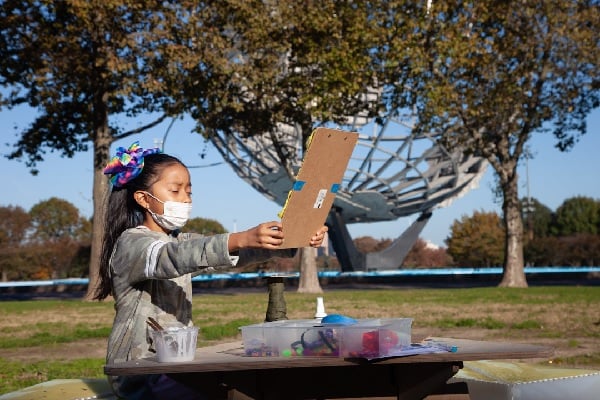
ACE wants its next National Portfolio to be more diverse and representative of the whole of England
NPO applications: here’s what you need to know
Timelines, deadlines and what Arts Council England is looking for in its 2023 portfolio.
At 80 pages, Arts Council England's guidance for organisations interested in being part of its next National Portfolio is a dense read, and that's before you tackle the briefings on its new Investment Principles Support Organisations, pay policy, access support and governance – an astonishing 398 pages altogether.
Let us break it down for you.
Am I eligible?
ACE wants new National Portfolio Organisations (NPOs) in its priority places, while DCMS wants investment to help level up the regions.
Naturally, current NPOs are eligible. Track record counts to the extent that it demonstrates your case for funding. Other metrics, such as environmental monitoring and the Creative Case for Diversity ratings, won't hold any sway.
But both old hands and newcomers need to demonstrate that they can deliver against at least one of the three outcomes of the Let's Create strategy, which is more focussed on broadening participation and developing individual creativity than its didactic predecessor, Great Art and Culture for Everyone.
First-time applicants need to have a Grantium account verified and an hour-long introductory conversation with an Arts Council officer by April 8.
Consortia can apply, but only the lead organisation will be considered an NPO.
What information do I need to provide?
On top of financial and activity plans, you must prove you can help ACE meet its strategic goals.
Applications will be rated on their adherence to the funder's investment principles – inclusivity and relevance, environmental responsibility, dynamism, and ambition and quality – and the "features" or "pillars" that make up each principle, as well as their contribution to ACE's outcomes – creative people, cultural communities, and a creative and cultural country – and their "elements".
Confused? Creative people = amateur and voluntary creative activity. Creative and cultural country = professional activity. Cultural communities means collaborations between the two.
Overwhelmed? Narrow your focus.
"Rather than trying to deliver all our outcomes and all their elements, we would recommend organisations focus on one or two outcomes and deliver against a limited number of elements in detail," ACE says.
However, organisations wanting more than £1m per year are expected to support all three outcomes and are "unlikely to be successful" otherwise.
How much can I apply for?
At least £50,000 for each of the three funded years.
Current NPOs can't apply for more than they got in the last portfolio; new applicants will be given a "planning figure" following their talks with ACE's officers.
Those seeking more can make their case, but only really stand a chance if they have diverse staff and boards or are located in parts of the country that traditionally receive less funding (ie: not London).
It remains to be seen how much funding is ultimately available.
ACE will once again use National Lottery money to fund the portfolio.
"We will not know how much of each type of funding we will use until we have been through the decision-making process," a spokesperson said.
What are my obligations as an NPO?
In short, we don't know yet.
ACE says there will be "specific requirements on monitoring and data reporting" and that funding can be withdrawn or reduced if NPOs fail to meet them.
But detail on these targets won't be provided until next month when the funder outlines its 'relationship frameworks'.
While current reporting obligations around attendance, workforce and sustainability will doubtless remain, we're also expecting new requirements to report on audience diversity.
Boards are due to take a leading role in holding organisations accountable, with fewer visits from ACE staff.
But the funder will intervene if organisations present a financial risk: "We expect to work more closely with applicants with major risk ratings during the funding agreement negotiation stage."
What is the difference between NPOs and IPSOs?
This year, ACE is replacing its Sector Support Organisations (SSOs), which were part of the last portfolio, with Investment Principles Support Organisations (IPSOs).
Different guidance documents aside, the application process is more or less the same.
IPSOs won't have to demonstrate how they deliver against ACE's outcomes, just how they plan to support NPOs to do so.
However, they must still embed the investment principles within their own organisation.
Beyond a new name, are they actually different to SSOs? Hardly. ACE's explanation as follows:
"IPSOs will focus on supporting individuals and organisations to adopt and embed one or more of the four investment principles of Let’s Create in their work.
"SSOs were instead focussed on the five goals of our previous 10-year strategy… as well as providing broad support for the sector."
When should I apply?
Hold your horses: an "addendum" is coming early next month with information you'll need.
Whilst the application portal opens midday February 14, ACE is still in talks with DCMS about how organisations will be expected to contribute to 'levelling up'.
ACE says the information won't change the eligibility criteria but is important for applicants to "take into consideration".
Key dates and deadlines (as at February 14):
February 28, midday: Applications open
April 8, 4pm: Deadline for aspiring NPOs to book an introductory conversation
April 22, 4pm: Deadline for creating a Grantium profile and introductory conversation
May 18, midday: Deadline for submitting applications
Decisions are due by October 14.
Join the Discussion
You must be logged in to post a comment.